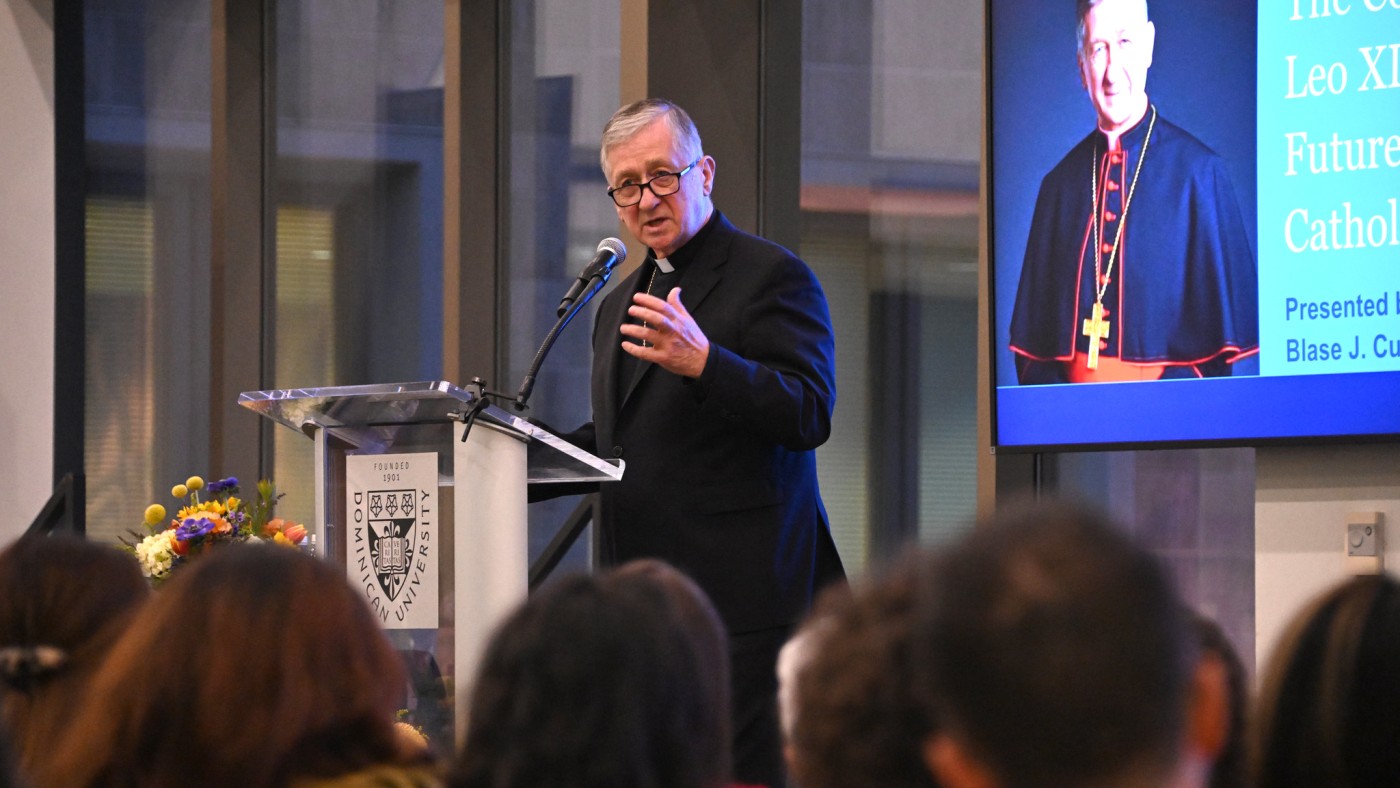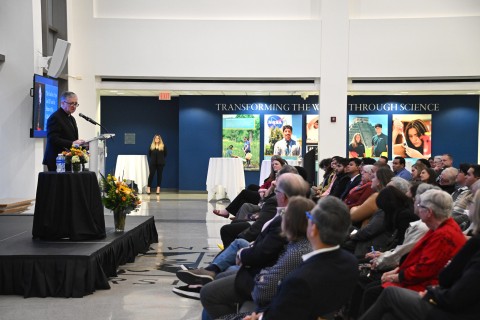Cardinal Blase Cupich Reflects on Pope’s Leadership, Human Dignity for Immigrants During DU Visit

River Forest, IL — Dominican University welcomed Cardinal Blase Cupich, archbishop of Chicago, this month for an intimate evening of reflection on his participation in the papal conclave, what to expect from Pope Leo XIV’s leadership, and how that leadership will shape the Catholic Church’s path forward.
An audience of about 120 attendees, consisting of invited students, staff, faculty, university board members, Sinsinawa Dominican Sisters and university supporters, gathered Oct. 13 in Parmer Hall for the address.
“During his visit to Dominican University, Cardinal Cupich brought messages of hope and action to our community,” said Dr. Clodagh Weldon, vice president of Mission and Ministry. “He challenged us to a consistent ethic of life and solidarity with our immigrant sisters and brothers.”
The Cardinal’s prior visits to the River Forest campus included celebrating Ash Wednesday Mass in Rosary Chapel in February 2020 and delivering a community address on “The Church as a Field Hospital” in 2016.
“I always enjoy coming here and being part of this wonderful community,” Cupich said, noting that Dominican will mark the 125th anniversary of its founding next year.
In his address, Cupich shared moments from his involvement in the conclave to elect a new pope, suggesting that the late Pope Francis “will go down in history as one of the most historic popes in the life of the church.” He shared that Pope Francis gave the church “a new direction” that he believes Pope Leo will continue in his own way.
“There’s a clear indication that the agenda of Pope Francis is going to continue, but maybe, like music it modulates in a different key, it will sound a little differently,” Cupich said.
He noted that Pope Leo has made immigrants a priority in his writings and statements and has expressed concerns about attempts at mass deportations in the United States.
“He has asked us to make clear that the Church surely respects the rights and obligations of the State to protect its borders, but he’s also asked us to point out that we cannot sacrifice human dignity in doing that,” Cupich said.

Maintaining this dignity means not painting the entire population of undocumented immigrants in a negative light, not permitting parents to be forcefully taken to detention centers in front of their children, and recognizing the “hard work that undocumented people do and how they contribute to society,” he said.
“It is the church’s voice that the pope wants us to raise on behalf of immigrants,” Cupich said, a statement that echoes Dominican University’s own, long-standing advocacy.
Cupich said he has “great confidence that the future is bright” for the Catholic Church under Pope Leo’s leadership. He encouraged the gathering of Dominican University students in synodality during these times of division and for the university to assist in this effort.
“In order to help us overcome polarization, let’s bring people of different attitudes, different perspectives together and just see how, in fact, we are able to find some common ground,” Cupich said. “In doing this, the deep divisions that many times are built on ignorance of each other can be abated.”
About Dominican University
Founded in 1901, Dominican University is a comprehensive, coeducational Catholic institution with campuses in River Forest and Chicago. The university offers an associate of arts in liberal arts and sciences; bachelor’s and master’s degrees through the Rosary College of Arts, Education, and Sciences, the College of Business, Information Studies, and Technology, and the Borra College of Health Sciences; as well as doctoral programs in information studies and applied social justice.
As Chicago's premier Catholic Hispanic-Serving Institution, Dominican is consistently recognized as a leader in academic excellence and value. U.S. News & World Report ranks Dominican University in the top 25 of Midwest regional master’s level universities, and #1 in Illinois for Best Value and ensuring the social mobility of its graduates.